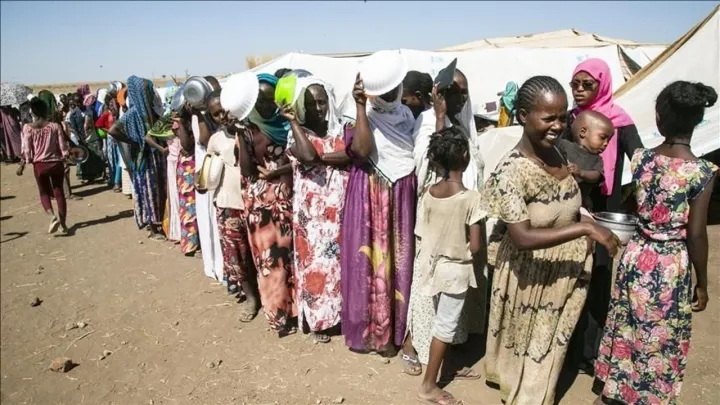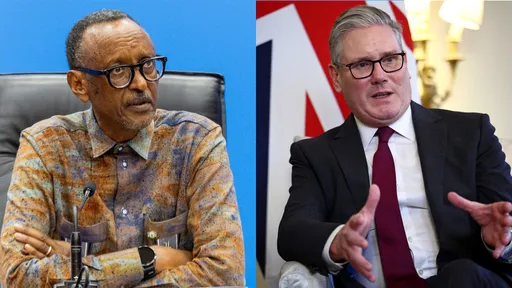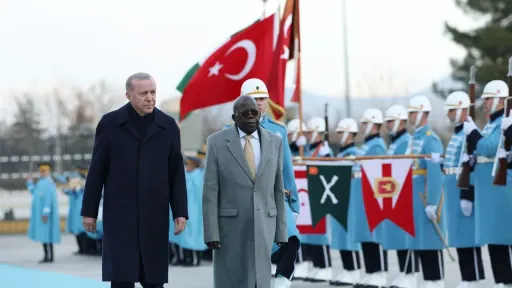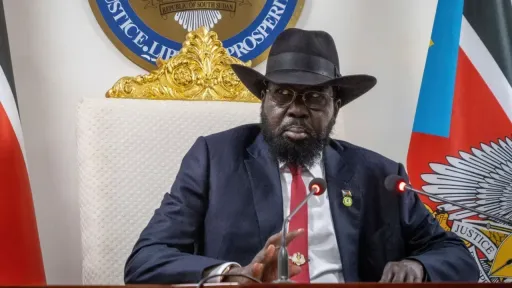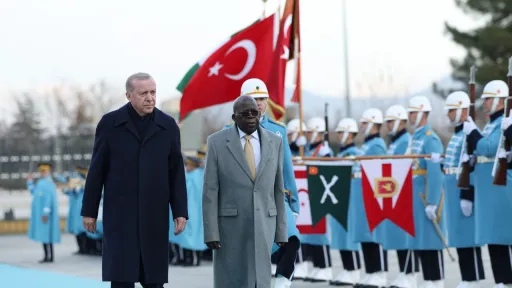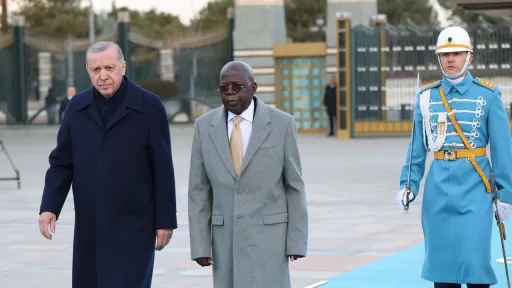Kenya's former Prime Minister Raila Odinga was an extraordinary politician: adored by his supporters, respected by his political opponents, and admired by the neutrals.
Odinga, 80, died of cardiac arrest while receiving treatment at a hospital in Kerala, southern India on October 15.
After news of his death broke on Wednesday, Kenya was thrown into monumental mourning. Odinga's family, friends, politicians, and even his critics, almost uniformly described him as statesman, a selfless leader who put Kenya's interests first.
Referring to Odinga as a "peacemaker", Kenya's President William Ruto eulogised the former prime minister as "a man who refused to accept the easy path when the right path was harder."
'Most significant leader of Kenya's democratic experiment'
"There can be no doubt that Hon Raila Odinga was the most significant leader of our democratic experiment. He carried himself with courage and grace and his voice, sometimes fiery, sometimes soft, always echoed with purpose," President Ruto said on Wednesday.
Kenya's fourth President Uhuru Kenyatta, who closely worked with Odinga during Kenyatta's second term between 2017 and 2022, said the ex-premier "was a man who made you sharpen your own ideas, compelling you to defend your positions with rigour and passion."
Kenya's former Vice President Kalonzo Musyoka described Odinga as an "exemplary leader, the president who won but was never declared and sworn into office."
Musyoka, perhaps, referred to the disputed 2007 presidential election in Kenya, which Odinga controversially lost to the then-President Mwai Kibaki, resulting in post-election violence that claimed more than 1,200 lives countrywide.
'Enigma and father of Kenya's democracy'
One of Odinga's fiercest opponents, Rigathi Gachagua — Kenya's former deputy president whose Odinga's party aided in his impeachment in October 2024 — colourfully eulogised the fallen leader as an "enigma" and the "father" of Kenya's democracy.
Gachagua said Odinga will not only be remembered for his "craft in resilience, persistence, and democratic values but also his voice during difficult moments."
Across Africa's political landscape, Odinga's presence loomed large.
The African Union Commission (AUC) chairperson Mahmoud Ali Youssouf, who defeated Odinga in the February 2025 AUC chairmanship election, described Odinga as a "towering figure in Kenya's political life and a steadfast champion of democracy, good governance, and people-centered development."
African leaders mourn Odinga
Youssouf added that Odinga's "decades-long commitment to justice, pluralism, and democratic reform left an indelible mark not only on Kenya but across the African continent."
African leaders, including Tanzania's President Samia Suluhu Hassan, Zambia's Hakainde Hichilema, South Africa's Cyril Ramaphosa, Ethiopia's Prime Minister Abiy Ahmed, Somalia's President Hassan Sheikh Mohamud, Djibouti's Ismail Omar Guelleh, South Sudan's Salva Kiir, Uganda's Yoweri Museveni, and Sierra Leone's Julius Maada Bio, sent their condolence messages on Wednesday.
In particular, President Ramaphosa said: "Raila Odinga was committed to the development of his own nation as well prosperity and the silencing of the guns on our continent", while President Kiir said Odinga was "a distinguished Pan-Africanist whose lifelong dedication to democracy, justice, and national unity made him an enduring symbol of leadership and integrity."
Evidently, Odinga effortlessly brought people together, his charisma was unmatched in Kenya's politics, and his fight for democratic principles is well documented.
Mastered the art of politics
The veteran leader had mastered the art of politics, a game he was active in for about four decades, spending most of it in the opposition.
Despite that, Odinga always found a way of accessing government, and pulling strings without necessarily acquiring an official state title.
After a seamless "entry" into government, cabinet ministers and other senior state officials often sought his advice and even updated him about the status of government projects.
But how did Odinga become so integral in Kenya's politics?
Son of Kenya's first vice-president
The late politician, a husband and father of four, was the son of Kenya's first Vice-President Jaramogi Oginga Odinga.
The elder Odinga was former President Mzee Jomo Kenyatta's vice after Kenya gained independence from Britain in 1963.
Oginga Odinga and Jomo fell out, leading to Odinga's resignation as vice president in 1966 and a subsequent toss to the opposition.
At the time, Raila Odinga was pursuing his college education in Germany.
Detention
Raila Odinga said on his official website that he was a holder of a degree in mechanical engineering. According to Kenya's University of Nairobi, Odinga was part of its academic staff in the 1970s.
He thereafter ventured into politics.
In 1982, Odinga was detained for six years without trial over allegations that he took part in the failed coup against the then-President Daniel arap Moi.
After his initial release, he was taken into custody twice before fleeing to Norway in 1991.
Odinga's return from self-imposed exile
In the run-up to the 1992 Kenyan elections, Odinga returned and successfully ran for parliament, representing a constituency in the capital Nairobi on an opposition party ticket.
In 1997 elections, Odinga ran for president but came third behind President Moi and seasoned politician Mwai Kibaki.
Odinga, however, managed to strike a truce with Moi and served as energy minister from 2001 to 2002.
Moi announced he would retire after the 2002 elections and Odinga was hoping to succeed him through the ruling party's ticket.
Support for Kenya's late President Mwai Kibaki
Moi, however, chose Uhuru Kenyatta — the son of Mzee Jomo Kenyatta — as his preferred successor. That forced Odinga to throw his support behind Mwai Kibaki in 2002 elections.
Kibaki won and Odinga was appointed roads minister between 2003 and 2005.
Odinga, however, fell out with President Kibaki over constitutional reform, defeating Kibaki's proposed constitution at the referendum in 2005.
Odinga then formed the Orange Democratic Movement (ODM), a political outfit he used to seek election in 2007, and controversially lost to Kibaki.
'Handshake' with former President Uhuru Kenyatta
Subsequent violence led to the formation of a coalition government between 2008 and 2013, with Kibaki serving as president and Odinga as prime minister.
In 2013 and 2017 presidential elections, Odinga unsuccessfully ran against Uhuru Kenyatta. On both occasions, he challenged the outcomes in court, alleging polls were rigged.
In March 2018, however, he struck a cooperation pact with Kenyatta, in what was known as the "handshake."
In 2022 elections, Odinga ran against his political protégé and Kenya's then-Deputy President William Ruto. However, Odinga lost the election despite enjoying Kenyatta's support.
Large support base
Ruto triumphed, getting nearly 7.2 million votes to narrowly cross the 50% mark. Odinga got 6.9 million, or 49% of the vote, and thereafter embarked on opposition duties, with many holding the belief that Odinga's political career would soon end.
He, however, emerged again in Ruto's government, with four of his party's top officials appointed as cabinet ministers in what President Ruto called a "broad-based government."
Odinga had a large support base in Kenya's politics, given the millions of votes he often garnered in back to back presidential elections.
This large support base, which stretched from the coastal region to his political heartland of Nyanza in Western Kenya, was Odinga's strongest positional advantage.
Upper hand during negotiations
It is this substantial following that granted him the upper hand against other opposition politicians during negotiations with government.
In Kenya's National Assembly, Odinga's party, the Orange Democratic Movement (ODM), has 86 seats, or 25% of the 349-member parliament.
President Ruto's party, the United Democratic Alliance (UDA), which has the highest parliamentary representation, has 145 members, or 42%.
The same membership pattern is replicated in Kenya's 67-member Senate.
Unsuccessful AU Commission chairmanship bid
In October 2024, Ruto's side needed Odinga's political muscle in parliament to ensure successful impeachment of former Deputy President Rigathi Gachagua, who had fallen out with the president.
After Odinga's African Union Commission chairmanship election defeat to Djibouti's Mahmoud Ali Youssouf in February 2025, the veteran politician's return to Kenyan politics necessitated political realignments.
At the time, a section of Kenyan members of parliament contemplated amending the constitution to introduce a powerful seat of prime minister.
The seat, according to some politicians, was to be reserved for Odinga. However, the talk of a possible constitutional amendment faded along the way without materialising into concrete policy.
Giant of Kenya's politics exits the stage
Some argued that a major hurdle for Odinga to assume the prime minister's seat once again was the requirement for Kenyans to approve the proposal through a referendum, a tall order in the country's modern political landscape.
The giant of Kenya's politics, who earned fond nicknames such as "Baba" (father), "Tinga" (tractor), and "Jakom" (chairman), exits the stage with a mixed legacy, but many agree that Odinga's political impact and contribution to Kenya are undeniable.
The late Kenyan leader is survived by his spouse, Ida Odinga, 75, and their children: Rosemary Odinga, 48; Raila Odinga Junior, 46; and Winnie Odinga, 35. Odinga's firstborn child with Ida, Fidel Castro Odinga, died in January 2015 at the age of 41.



